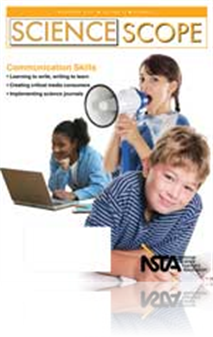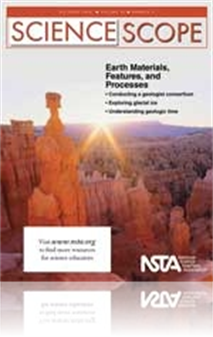All Science Scope resources
Journal Article
Science Sampler: Using science journals to encourage all students to write
It seems that everyone is using science journals or notebooks lately. As middle school science teachers, the authors use science journals as a tool to enhance students' knowledge and understanding of content and reinforce students' writing skills. He...
Journal Article
Learning to Write and Writing to Learn in Science: Refutational Texts and Analytical Rubrics
Most middle school science teachers are familiar with the idea of reading and writing across the curriculum. We, as science teachers, understand that our students need time, practice, and lots of encouragement in order to learn how to read and write ...
Journal Article
Science Sampler: Science SLAMS—A reading strategy for answering open-ended questions
The SLAMS (Sentence, Lines, Answer, Mechanics, Support) (Crowell and Kolba 2006) strategy is a basic and relatively simple technique used to guide students to answer open-ended questions when reading nonfiction. This strategy gives students the oppor...
Journal Article
Science Sampler: Science and literacy—Making connections through writing
In order to help students to make connections in science and literacy through writing, the authors present them with an open-ended question (OEQ), which is a divergent assessment in the form of a writing prompt (a situation), and directions for writi...
Journal Article
Science Sampler: Field Journals—Bringing the past to life
In this activity, students travel back in time as explorers to collect scientific information on plant and animal life during various geological eras. The author uses the book, The Deep Time Diaries as way to bring literature into the science classro...
Journal Article
Media and Science: Developing Skepticism and Critical Thinking
Science lessons can encourage students to view data with a scientists' skeptical eye—especially now that so much unrefereed information is online, in advertising, and in other media sources. In developing the skills of media literacy as part of sci...
Journal Article
The Thinking Machine: A Physical Science Project
Science projects can be a wonderful opportunity for learning and creativity, or a gigantic headache for teachers. After several years of implementation, experience, and revision, the author has put together a fun and engaging project centered on mach...
Journal Article
The Great Dinosaur Feud: Science Against All Odds
In the 19th century, the race to uncover dinosaur fossils and name new dinosaur species inspired two rival scientists, Edward Drinker Cope and Othniel Charles Marsh, to behave in ways that were the antithesis of scientific methods. Subterfuge, theft,...
Journal Article
The 23rd Annual Consortium of Geologists
Today’s scientific theories are the result of a long collaborative process, sometimes over centuries, among many different scientists from various parts of the world. To communicate this concept to middle school students and introduce them to the t...
Journal Article
Science Sampler: When do girls lose interest in math and science?
To determine when girls lose interest in math and science, the authors surveyed female students in grades 4 through 8 in several school districts in southwestern Ohio to try to answer three questions: (1) Do girls stop liking science? If so, at which...
Journal Article
Science Sampler: Chemical weathering—Where did the rocks go?
This lesson is part of a larger Earth science unit that combines the concepts of the rock cycle and the water cycle and how they interact to change landforms. The authors refer to it as the “make it and then break it” unit. They spend half the un...
Journal Article
After the Bell: Developing an awareness of pet stewardship
Given the commonness of pets in communities throughout the United States, Canada, and Australia, among other countries, pet stewardship should be a natural topic of study for the integration of science, mathematics, and technology. Therefore, the ter...
Journal Article
The National Science Foundation-funded Arctic Climate Modeling Program (ACMP) provides “curriculum resource-based professional development” materials that combine current science information with practical classroom instruction embedded with “b...
Journal Article
Networking Antarctic Research Discoveries to a Science Classroom
In 2006, a unique scenario transported eighth-grade Earth science students from the classroom into the cold, dry, pristine surroundings of Antarctica. The mission was to expose the students to hands-on science using satellite telephones, Contact 3.0 ...




